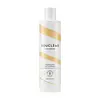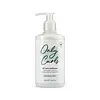What's inside
What's inside
 Key Ingredients
Key Ingredients

No key ingredients
 Benefits
Benefits

 Concerns
Concerns

 Ingredients Side-by-side
Ingredients Side-by-side

Water
Skin ConditioningCetearyl Alcohol
EmollientGlycerin
HumectantPolyglyceryl-3 Dicitrate/Stearate
EmulsifyingArgania Spinosa Kernel Oil
EmollientCocos Nucifera Oil
MaskingLinum Usitatissimum Seed Oil
PerfumingHydroxypropyltrimonium Honey
Punica Granatum Fruit Extract
AntioxidantGuar Hydroxypropyltrimonium Chloride
Skin ConditioningAloe Barbadensis Leaf Juice
Skin ConditioningHydroxyethylcellulose
Emulsion StabilisingDistearoylethyl Dimonium Chloride
Benzyl Alcohol
PerfumingDehydroacetic Acid
PreservativeSorbic Acid
PreservativeCitric Acid
BufferingWater, Cetearyl Alcohol, Glycerin, Polyglyceryl-3 Dicitrate/Stearate, Argania Spinosa Kernel Oil, Cocos Nucifera Oil, Linum Usitatissimum Seed Oil, Hydroxypropyltrimonium Honey, Punica Granatum Fruit Extract, Guar Hydroxypropyltrimonium Chloride, Aloe Barbadensis Leaf Juice, Hydroxyethylcellulose, Distearoylethyl Dimonium Chloride, Benzyl Alcohol, Dehydroacetic Acid, Sorbic Acid, Citric Acid
Water
Skin ConditioningCetearyl Alcohol
EmollientCetyl Alcohol
EmollientBehentrimonium Chloride
PreservativeBenzyl Alcohol
PerfumingCetrimonium Chloride
AntimicrobialAleurites Moluccanus Seed Oil
Skin ConditioningGuar Hydroxypropyltrimonium Chloride
Skin ConditioningArgania Spinosa Kernel Oil
EmollientCocos Nucifera Oil
MaskingMacadamia Integrifolia Seed Oil
Skin ConditioningPanthenol
Skin ConditioningPersea Gratissima Oil
Skin ConditioningSimmondsia Chinensis Seed Oil
EmollientDehydroacetic Acid
PreservativeWater, Cetearyl Alcohol, Cetyl Alcohol, Behentrimonium Chloride, Benzyl Alcohol, Cetrimonium Chloride, Aleurites Moluccanus Seed Oil, Guar Hydroxypropyltrimonium Chloride, Argania Spinosa Kernel Oil, Cocos Nucifera Oil, Macadamia Integrifolia Seed Oil, Panthenol, Persea Gratissima Oil, Simmondsia Chinensis Seed Oil, Dehydroacetic Acid
Ingredients Explained
These ingredients are found in both products.
Ingredients higher up in an ingredient list are typically present in a larger amount.
You may know this ingredient as argan oil. Argan Oil has antioxidant, hydrating, and soothing properties.
Studies have shown argan oil can help fight again radical damage from the sun. This makes it effective at preventing hyperpigmentation.
Large amounts of vitamin E found in argan oil helps the skin retain water. Argan oil also contains fatty acids such as linoleic acid, oleic acid, and palmitic acid. It is also a good source of lipids.
Another benefit of argan oil is skin-soothing. It can help reduce inflammation-related skin symptoms.
Argan Oil is effective at regulating sebum production in pores. This can make it effective at treating hormonal acne.
Traditionally, argan oil was used for its antibacterial and antifungal properties. However, argan oil contains fatty acids that may make it not fungal-acne safe.
Argan Trees are native to Morocco.
Learn more about Argania Spinosa Kernel OilBenzyl Alcohol is most commonly used as a preservative. It also has a subtle, sweet smell. Small amounts of Benzyl Alcohol is not irritating and safe to use in skincare products. Most Benzyl Alcohol is derived from fruits such as apricots.
Benzyl Alcohol has both antibacterial and antioxidant properties. These properties help lengthen the shelf life of products. Benzyl Alcohol is a solvent and helps dissolve other ingredients. It can also improve the texture and spreadability.
Alcohol comes in many different forms. Different types of alcohol will have different effects on skin. This ingredient is an astringent alcohol.
Using high concentrations of these alcohols are drying on the skin. They may strip away your skin's natural oils and even damage your skin barrier. Astringent alcohols may also irritate skin.
Other types of astringent alcohols include:
According to the National Rosacea Society based in the US, you should be mindful of products with these alcohols in the top half of ingredients.
Any type of sanitizing product will have high amounts of alcohol to help kill bacteria and viruses.
Learn more about Benzyl AlcoholCetearyl alcohol is a mixture of two fatty alcohols: cetyl alcohol and stearyl alcohol. It is mainly used as an emulsifier. Emulsifiers help prevent the separation of oils and products. Due to its composition, it can also be used to thicken a product or help create foam.
Cetearyl alcohol is an emollient. Emollients help soothe and hydrate the skin by trapping moisture.
Studies show Cetearyl alcohol is non-toxic and non-irritating. The FDA allows products labeled "alcohol-free" to have fatty alcohols.
This ingredient is usually derived from plant oils such as palm, vegetable, or coconut oils. There is debate on whether this ingredient will cause acne.
Due to the fatty acid base, this ingredient may not be Malassezia folliculitis safe.
Learn more about Cetearyl AlcoholCocos Nucifera Oil is obtained from the kernels of the coconut fruit. In other words, this is coconut oil.
Coconut Oil is rich in fatty acids with lauric acid making up the majority of these. It also contains linoleic acid. Due to this high fatty acid content, coconut oil helps trap moisture and soften skin.
Despite being antibacterial, coconut oil may not be great for acne-prone skin. It is comedogenic and may clog pores. This ingredient may not be safe for malassezia or fungal acne.
Note: Coconut Oil should not replace your sunscreen for UV protection. Studies show it only blocks about 20% of UV.
This oil is non-volatile and has a light scent.
The term 'fragrance' is not regulated in many countries. In many cases, it is up to the brand to define this term. For instance, many brands choose to label themselves as "fragrance-free" because they are not using synthetic fragrances. However, their products may still contain ingredients such as essential oils that are considered a fragrance.
Learn more about Cocos Nucifera OilDehydroacetic Acid is fungicide and bactericide. It is used as a preservative in cosmetics. Preservatives help elongate the shelf life of a product.
Dehydroacetic Acid is not soluble in water.
This ingredient is derived from guar gum.
It is a conditioning ingredient, meaning it helps soften skin and hair.
Water. It's the most common cosmetic ingredient of all. You'll usually see it at the top of ingredient lists, meaning that it makes up the largest part of the product.
So why is it so popular? Water most often acts as a solvent - this means that it helps dissolve other ingredients into the formulation.
You'll also recognize water as that liquid we all need to stay alive. If you see this, drink a glass of water. Stay hydrated!
Learn more about Water